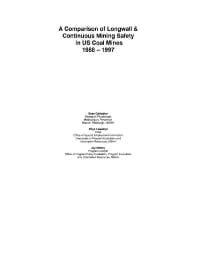Mining Publication: A Comparison of Longwall & Continuous Mining Safety in U.S. Coal Mines 1988-1997
Original creation date: June 1998
Authors: S Gallagher, R Llewellyn, J Mattos
NIOSHTIC2 Number: 20022705
Proceedings of Longwall USA International Exhibition & Conference, 1998 Jun :91-101
This paper contains the results of an examination of accident, injury, employment, and production information reported to the U.S. Department of Labor's Mines Safety and Health Administration (MSHA) and provides information on some of the measures longwall mine operators are using to prevent accidents. In all industries, technological advances play a key role in determining those who will survive as competitive participants in an increasingly global marketplace. While mining is among the most basic of industries, technological change is neither unfamiliar nor unwelcome to miners. Historically, technological advances in mining, particularly coal mining, have tracked closely with fluctuations in demand. There is little doubt that longwall mining has greatly increased underground coal mining productivity. The degree to which longwall mining has contributed to a safer work environment for underground miners is more difficult to ascertain.

NIOSHTIC2 Number: 20022705
Proceedings of Longwall USA International Exhibition & Conference, 1998 Jun :91-101
- A CART Technique to Adjust Production from Longwall Coal Operations under Ventilation Constraints
- Guidelines for the Control and Monitoring of Methane Gas on Continuous Mining Operations
- Independent Contractor Trends in the United States Mining Industry
- Knowledge Management and Transfer for Mine Emergency Response
- Potential of Roof Screening to Reduce Workers' Compensation Cost
- Prediction of Longwall Methane Emissions and the Associated Consequences of Increasing Longwall Face Lengths: A Case Study in the Pittsburgh Coalbed
- Prediction of Longwall Methane Emissions: An Evaluation of the Influence of Mining Practices on Gas Emissions and Methane Control Systems
- Reservoir Engineering Considerations for Coal Seam Degasification and Methane Control in Underground Mines
- Technology News 439 - Remote Reset Systems for Continuous Mining Machines Used In Extended Cuts
- Visual Performance for Trip Hazard Detection When Using Incandescent and LED Miner Cap Lamps